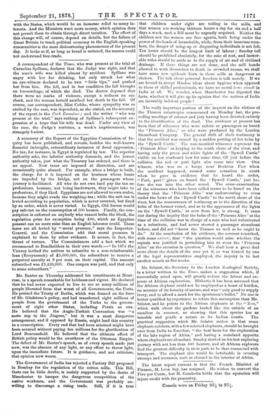A summary of the Report of the Egyptian Commission of
In- quiry has been published, and reveals, besides the well-known financial imbroglio, extraordinary instances of fiscal oppression. No tax, for instance, in Egypt is regulated by law. The superior authority asks, the inferior authority demands, and the lowest authority takes, just what the Treasury has ordered, and there is no appeal. New taxes are imposed at discretion, and are occasionally quite absurd. For example, when a bridge is built, the charge for it is imposed on the boatmen whose boats are impeded by the bridge, not on the passengers whose journey is facilitated. All who do not own land pay the tax on professions, because, not being landowners, they might take to professions, if they liked. Egyptians are not allowed to own scales, because they might evade the weighing-tax; while the salt-tax is levied according to population, which is never counted, but fixed by an order, which is never varied. In Egypt, Old Sarum would pay salt-tax on the consumption of 500 houses. Finally, the con- scription is enforced on anybody who cannot bribe the Sheik, the regulation price for exemption being £80, which an Egyptian peasant can no more raise than an English labourer could. These taxes are all levied by " moral pressure," says the Inspector- General, and the Commission add that moral pressure is explained to them by other evidence. It means, in fact, the threat of torture. The Commissioners add a fact which we recommend to Bondholders in their own words :—" In 1874 the Viceroy invited the natives to subscribe to a non-reimbursable loan (Rouynameh) of £5,000,000, the subscribers to receive a perpetual annuity at 9 per cent. on their capital. The amount subscribed was /3,420,000. One coupon was paid, and that only to some subscribers."






























 Previous page
Previous page